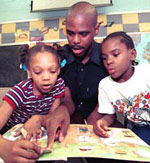Tip sheets highlight timely news and events at Washington University in St. Louis. For more information on any of the stories below or for assistance in arranging interviews, please see the contact information listed with each story.
‘Courageous actions’ brighten future
Gay and lesbian youth ‘beginning to see marriage as an option’

Earth Day may arrive each April, but for architecture students and faculty, environmental design is increasingly part of the year-round curriculum. At the same time, a growing number of American universities are challenging themselves to implement green principles on their own campuses. From ivy-covered walls and tree-lined walkways, new ideals are taking shape: highly efficient buildings — constructed of local, sustainable materials — that reduce waste and minimize strain on local infrastructures; a holistic approach that considers operational as well as construction costs; and entire universities that might someday achieve net zero environmental impact.
Society anxieties
Crippling anxiety disorders often helped by behavioral therapy

Citing statistics that show that many people fear public speaking more than death, comedian Jerry Seinfeld once joked that if you’re at a funeral, you’re better off in the casket than doing the eulogy. But for people who suffer from social anxiety disorders, one of which is public speaking, it’s no laughing matter. These people’s personal lives and careers can be sidelined by fear of certain social situations, such as speaking with a boss or authority figure, making telephone calls or attending parties. The good news is that these disorders are highly treatable through cognitive behavior therapy, in particular, group therapy, according to a psychologist at Washington University in St. Louis.
Redefining the achievement gap
Highlighting test scores deflects from the real problems confronting students in American schools, educator says

As President Bush’s struggling No Child Left Behind Act heats up as a presidential campaign issue, the achievement gap in American schools continues to widen. Can we ever hope to close the racial, ethnic and economic gaps in schools? An education researcher at Washington University in St. Louis thinks it is possible — we just need to think of the achievement gap in different terms.